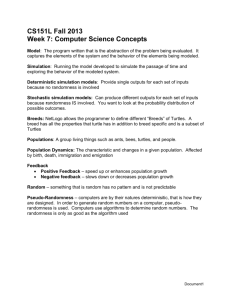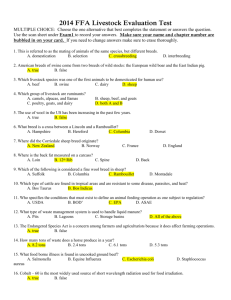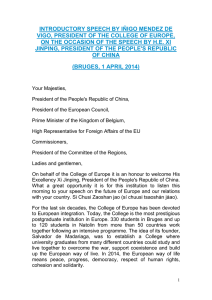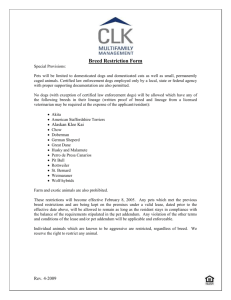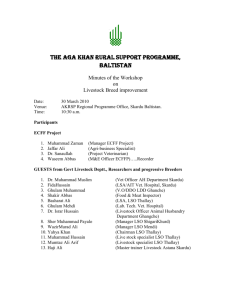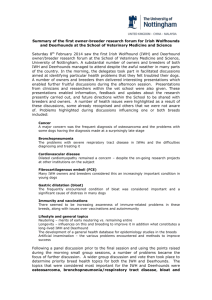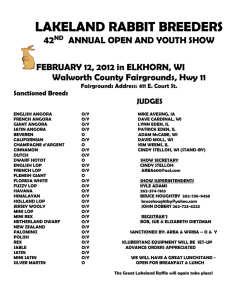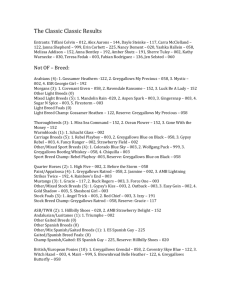A Letter To My Vet by Jan Grebe - French Bulldog Club of Puget
advertisement
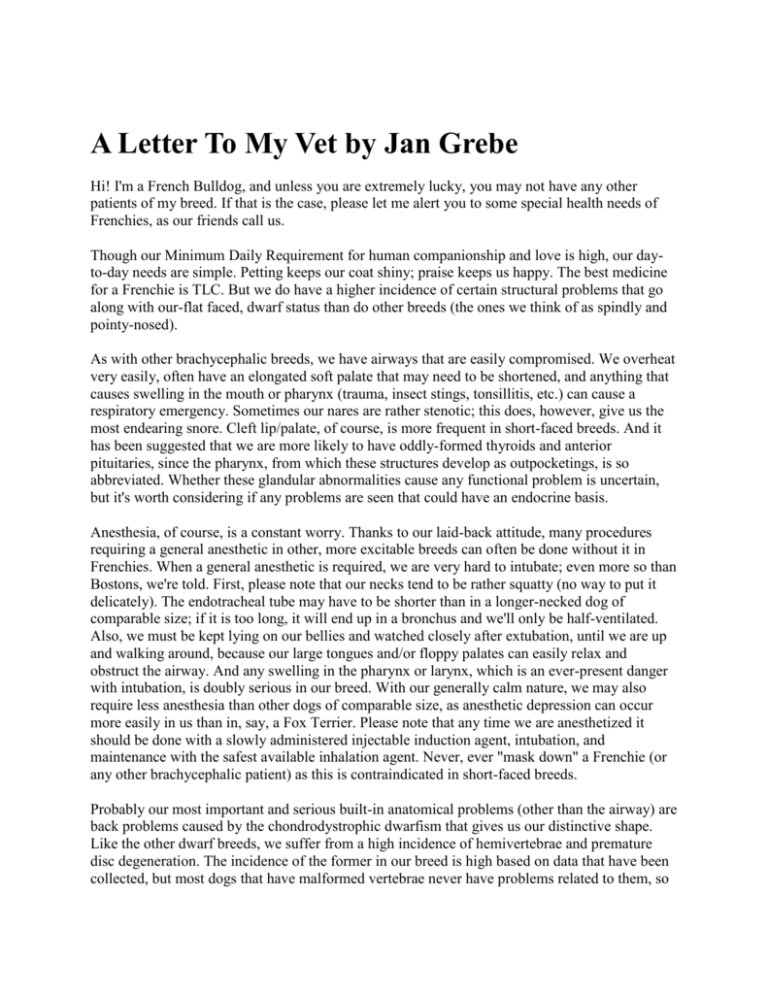
A Letter To My Vet by Jan Grebe Hi! I'm a French Bulldog, and unless you are extremely lucky, you may not have any other patients of my breed. If that is the case, please let me alert you to some special health needs of Frenchies, as our friends call us. Though our Minimum Daily Requirement for human companionship and love is high, our dayto-day needs are simple. Petting keeps our coat shiny; praise keeps us happy. The best medicine for a Frenchie is TLC. But we do have a higher incidence of certain structural problems that go along with our-flat faced, dwarf status than do other breeds (the ones we think of as spindly and pointy-nosed). As with other brachycephalic breeds, we have airways that are easily compromised. We overheat very easily, often have an elongated soft palate that may need to be shortened, and anything that causes swelling in the mouth or pharynx (trauma, insect stings, tonsillitis, etc.) can cause a respiratory emergency. Sometimes our nares are rather stenotic; this does, however, give us the most endearing snore. Cleft lip/palate, of course, is more frequent in short-faced breeds. And it has been suggested that we are more likely to have oddly-formed thyroids and anterior pituitaries, since the pharynx, from which these structures develop as outpocketings, is so abbreviated. Whether these glandular abnormalities cause any functional problem is uncertain, but it's worth considering if any problems are seen that could have an endocrine basis. Anesthesia, of course, is a constant worry. Thanks to our laid-back attitude, many procedures requiring a general anesthetic in other, more excitable breeds can often be done without it in Frenchies. When a general anesthetic is required, we are very hard to intubate; even more so than Bostons, we're told. First, please note that our necks tend to be rather squatty (no way to put it delicately). The endotracheal tube may have to be shorter than in a longer-necked dog of comparable size; if it is too long, it will end up in a bronchus and we'll only be half-ventilated. Also, we must be kept lying on our bellies and watched closely after extubation, until we are up and walking around, because our large tongues and/or floppy palates can easily relax and obstruct the airway. And any swelling in the pharynx or larynx, which is an ever-present danger with intubation, is doubly serious in our breed. With our generally calm nature, we may also require less anesthesia than other dogs of comparable size, as anesthetic depression can occur more easily in us than in, say, a Fox Terrier. Please note that any time we are anesthetized it should be done with a slowly administered injectable induction agent, intubation, and maintenance with the safest available inhalation agent. Never, ever "mask down" a Frenchie (or any other brachycephalic patient) as this is contraindicated in short-faced breeds. Probably our most important and serious built-in anatomical problems (other than the airway) are back problems caused by the chondrodystrophic dwarfism that gives us our distinctive shape. Like the other dwarf breeds, we suffer from a high incidence of hemivertebrae and premature disc degeneration. The incidence of the former in our breed is high based on data that have been collected, but most dogs that have malformed vertebrae never have problems related to them, so that they are often only detected incidentally on a radiograph done for some other reason. If they do occur, they are most often seen between T5 - T11; a single vertebra may be involved, but often there are two or more. Depending on which part of the vertebra is malformed, they may cause scoliosis or kyphosis; and this can produce secondary changes in the rib cage. Premature intervertebral disc degeneration most often is seen in 3- to 5-year old dogs and generally affects the discs between C2 - C4 and T11 - L2. Disc degeneration that is a consequence of age is more likely in the cervical region. If you should note any hemivertebrae, calcified discs, or narrowing of discs spaces on an x-ray, or palpate any bony deformities, please instruct my owner about how to best protect my back, and what neurological signs to watch for in case problems should develop. Should I develop sudden pain and hindlimb weakness with neurological signs suggestive of spinal cord compression, an injection of steroids followed by a Prednisone taper and strict crate rest for several weeks will generally allow the problem to resolve without surgery. However, should my condition worsen in spite of this, speedy surgical decompression is needed. Many Frenchies are frisking happily about today after extensive spinal surgery, because their owners quickly sought help at the first sign of trouble, before the cord was permanently damaged. As is the case with Bostons and Bulldogs, we often have whelping difficulties. Though some Frenchies are free whelpers, the combination of the big head and narrow pelvis combined with uterine inertia often necessitates cesarean delivery. (Considering the anesthesia risk, this helps explain why finding a Frenchie puppy may not be an easy task.) We also seem to be plagued by pyometra more often than other breeds; some believe that our odd construction tilts the female reproductive tract in such a way that it doesn't drain properly. Whatever the cause, this is a problem to watch for. Impacted anal glands may also afflict us (especially if the screw tail torques sharply to one side and compresses a duct.) We may suffer from most of the other usual canine ills. Some people feel that Frenchies with lighter coat colors have more skin problems than do the darker ones. Whether this is a factor, skin problems tend to be more common in hot, damp climates, where every variety of fungus and bacterium tends to flourish. Atopic skin disease is also common, and skin fold dermatitis can occur when the deep folds on the face and in the rear are not kept clean and dry. Though hip dysplasia is not known to be a major clinical problem, it has been reported in the breed. But Frenchie hips that do not look very good on a radiograph may never cause any clinical problems because our massive thigh muscles and good ligaments can compensate well, so even if OFA doesn't give us good scores, we can generally go through life without developing degenerative hip arthritis. Our breeders are constantly trying to produce sounder pups, and the French Bull Dog Club of America has established a Health and Genetics Committee to gather information about health problems in the breed that might be inheritable, serve as a liaison with the AKC Canine Health Foundation, raise funds for health research, and to help educate breeders about potential inheritable problems. We would appreciate your help in this regard. If you should detect in a Frenchie patient any problem that you believe is genetic, please discuss this with the owner and/or breeder of the dog so that we might avoid the spreading of harmful genes through the breed. Our gene pool is so small that a recessive gene in a popular sire could spread like wildfire; and early detection requires the help of our vets. We Frenchies are a proud lot, and are rapidly increasing in popularity. We would appreciate any new observations or information that you might give us about our breed to help our breeders and owners keep us sound and happy, both as a breed and as individuals. And, finally, should the time come when — because of age, injury, or illness — my life should become more burden to me than blessing, please help my owner/friend make and accept the most loving and kind decision. Tell him to "Sing no sad songs for me," but to know that my life, however short or long, was an enviable one. I was a French Bulldog. (Modified from the original published in The French Bullytin, Vol. 6 No. 4, 1988)
